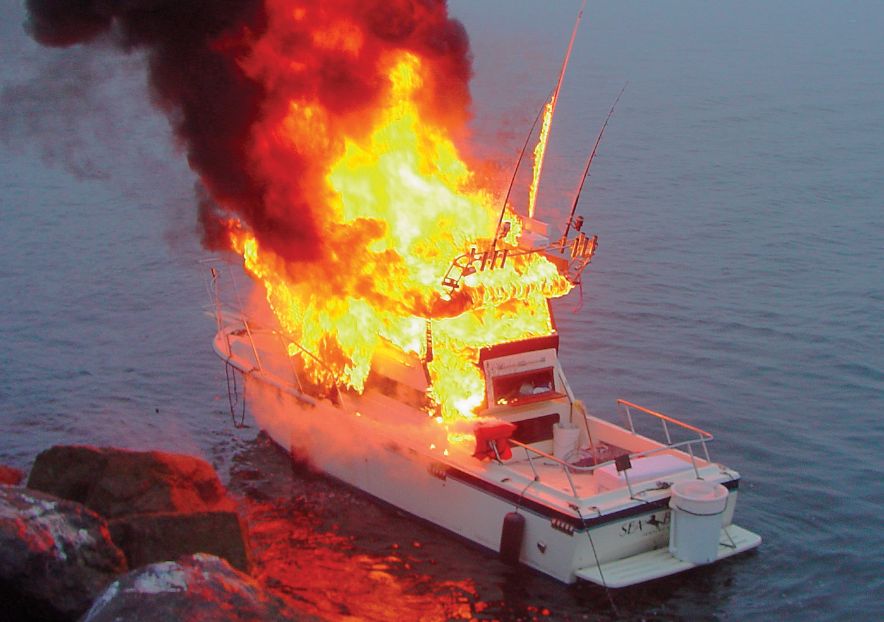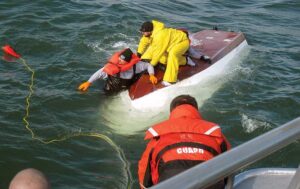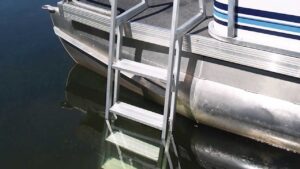Motorboat fires are more dangerous and more common than you might think. As a result, I made the decision to write this article as a guide about what to do right away if a boat motor catches fire.
You are enjoying yourself while the sun is shining and the water is calm. The engine suddenly catches fire, and you hear an explosion. What must be done right away if a boat motor catches fire? If at all possible, try to cut off the fuel supply in case your motorboat catches fire. Then, after using a fire extinguisher to put out the flames, immediately call for assistance.
To learn more about how to put out boat motor fires, keep reading. You can save both the people on the boat and the boat itself if you stay vigilant.
What Should You Do Immediately If a Boat Catches Fire?
No matter how carefully you have prepared, a fire can occasionally still start despite your best efforts. The reason for this is that there are many parts of boats that can cause heat or flames.
In addition to the specifics already mentioned, there are a few other things you can do immediately if a fire starts on your boat.
Stop the Boat Immediately
The boat must be stopped immediately if the motor is on fire while it is still running. The engine will automatically shut off in cases of severe damage. If not, you must manually stop the process to stop the flames from getting worse.
When a fire first appears, turn the engine off. The fuel line, electrical connections, gas pipes, and other potential ignition sources should all receive the same treatment.
Position the Boat Safely
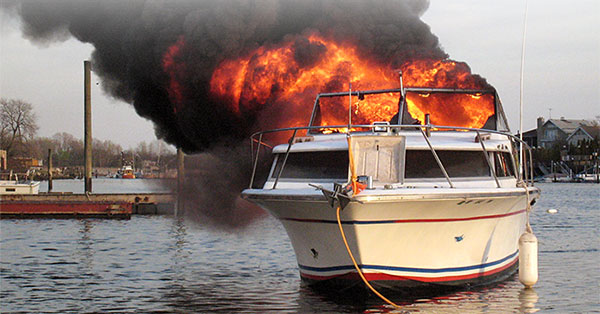
Most people do not have the luxury of alertness during emergencies. But it’s important to pay close attention. Maintain the boat in a location where passengers can easily and safely escape. To decide where you should go, evaluate your surroundings.
One of the most crucial things to keep in mind is to keep the boat away from the wind. In the alternative, the fire’s range will be expanded by the wind spreading the flames.
Extinguish the Fire
The US Coast Guard mandates that every vessel have at least one marine fire extinguisher. However, you need at least two for boats between 26 and 40 feet in length. In unforeseen circumstances, it is a lifesaver.
A common error is to aim for the fire extinguisher before removing the motor’s cover. More damage will be done as a result. It will be more difficult to react because the smoke will pour out and surround you.
How to Choose a Fire Extinguisher
Extinguishers differ in different ways. It’s possible that the one you have at home won’t fit your boat. The classification of the fire extinguisher is the most crucial factor. Combustible solids fall under Class A, and flammable liquids fall under Class B. Electrical fires fall under Class C, while flammable metals fall under Class D.
Since gas fires in boats are the most frequent, a Class B fire extinguisher is frequently required by law. We suggest one that fights all kinds of fires for your peace of mind. If so, you might want to think about a Kidde FA Multi-Purpose Fire Extinguisher.
Using a Fire Extinguisher
Just having a fire extinguisher on board is insufficient. If you do not know how to use it properly, it is useless.
The lesson from the video that should stick with you the most is to have the guts to start the fire and maintain your composure. When you are ready, pull the pin, position it so that it covers the fire on the motor, squeeze the handles, and sweep.
Always use a fire extinguisher rather than dousing a burning motor with water. Water can cause electrocution, which creates another issue, especially when there are electrical components.
Care and Maintenance
Extinguishers are susceptible to issues over time. Pay attention to proper maintenance, especially storage, to guarantee peak performance. A charge should always be present in the gauge. Verify the hose for cracks and broken seals.

What Are the Main Causes of Boat Fires?
Off-shore and battery sources are just two of the many factors that can cause a boat fire. However, the most common roots of fires on boats are the following:
- Fires caused by direct current electricity
- Electrical sparks in AC units
- Several other engine-related fires
- Shrink-wrapping of fuel stoves
The various fires on boats have been grouped into classes, each denoted by an alphabetical letter, as follows:
- A: fires involving solids like paper, wood, bedding, and so forth.
- B: fires involving liquids like oil or gasoline.
- C: Gas-related explosions.
- D: Explosions involving metal.
- F: cooking oil and fat on a fire.
How to Prevent a Fire on Your Boat?
I’ve gathered some boat fire prevention advice to help you avoid having a fire start in the first place.
- Never combine heat, oxygen, or fuel because this will start a fire.
- Verify that the ventilation systems in your home are tested and functional.
- Regularly maintain your engine and fuel system, making sure the bilges are clean.
- Ensure that all passengers are aware of and familiar with your fire action plan.
- Add carbon monoxide and smoke detectors to your boat.
- On your boat, periodically test each alarm.
- In the cabin and bilge spaces, install a gas vapor detector.
- Before you go to bed or leave the boat, turn off the LPG cylinder valves.
- Always make sure that all appliances are turned off when not in use.
- Use metal ashtrays if you’re smoking, and make sure the butts are out.
- Over gas hobs in the kitchen, do not hang curtains.
- Have an emergency escape strategy in place.
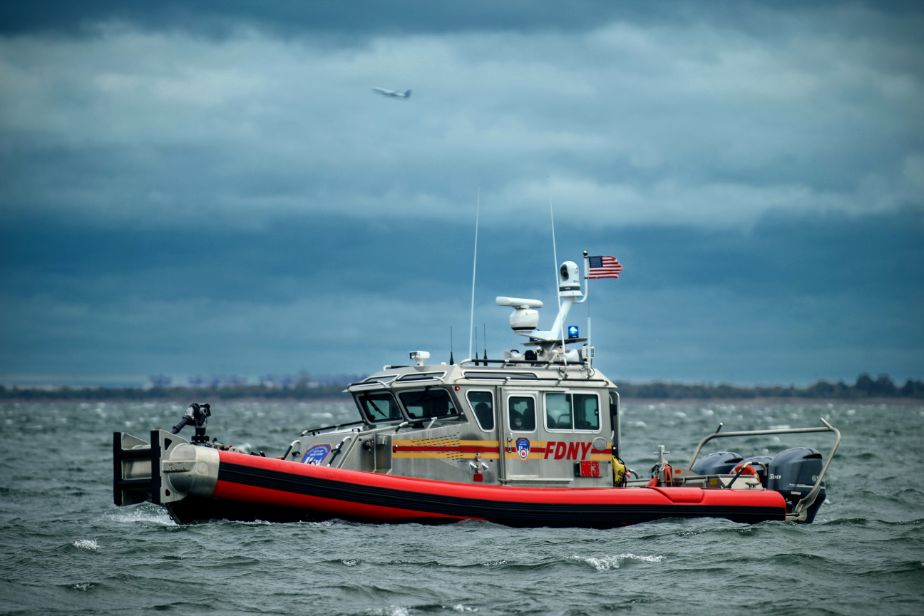
First Aid Kit for Marine, Boats, and Motorboats
Mild or severe injuries can happen at any time, but they are particularly common when traveling by water. Being in a remote location makes it more difficult to provide medical attention for these injuries. So it’s crucial to equip your ship with some basic first aid supplies.
Bandages, gauze pads, alcohol, betadine, gauze tape, cotton, swabs, scissors, and a host of other items are required in every first aid kit. The number of supplies you have on board must match the average number of passengers.
In addition to a first aid kit, there should be several forms of communication available onboard in case of an emergency. These include VHF radios, flares, and audio equipment such as horns or megaphones.
Conclusion
Whilst I hope that this article has helped you answer the question “what should you do immediately if a motor boat catches fire” I don’t want you to come to this page, get the right answer, and leave without learning anything.
Boat fires are much riskier and more common than you might expect, despite the fact that boating is a luxury with many risks. Stop the boat immediately and shut off the engine if you notice a fire on the motor. Use a fire extinguisher and place it out of the wind.

